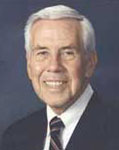 An aerial promotion campaign for ethanol in the Sunshine State took off this past weekend over the racetrack at Sebring, the theme parks in Orlando and the beaches of Fort Meyers.
An aerial promotion campaign for ethanol in the Sunshine State took off this past weekend over the racetrack at Sebring, the theme parks in Orlando and the beaches of Fort Meyers.
The Ethanol Promotion and Information Council will be flying this banner over cities from Miami to Jacksonville in the next few weeks to get the message out that Florida Needs Ethanol.
According to EPIC, ethanol is currently blended in 46% of our nation’s fuel supply with the majority of the fuel blended with 10% ethanol. But in many major cities, such as Tampa, consumers currently do not have access to purchase even a 10 percent ethanol blend, although it can be used in any of today’s cars.
“Ethanol’s performance and environmental benefits resonate with consumers,” said Reece Nanfito, EPIC’s senior director of marketing. “It may take time, but ethanol-enriched fuels need to be a part of Florida’s energy future.”
 Florida Commissioner of Agriculture Charles Bronson agrees. “As we develop cellulosic technology in Florida, I think that’s what we are going to be the most well-known for,” said Bronson. “We working with the University of Florida to find out which crops will be most beneficial to produce ethanol.”
Florida Commissioner of Agriculture Charles Bronson agrees. “As we develop cellulosic technology in Florida, I think that’s what we are going to be the most well-known for,” said Bronson. “We working with the University of Florida to find out which crops will be most beneficial to produce ethanol.”
Bronson is working to get the Florida Legislature to fund more incentives for biofuels production and research in Florida. He also sees a bright future for biodiesel production in the state. “Research I have seen on blue-green algae says that may be the very one that’s going to take over biodiesel because you can make so much diesel out of that blue green algae and we can grow a lot of that in Florida. So I think we are going to lead the nation in that.”
Listen to an interview with Commissioner Bronson from Katherine Bush with Southeast Agnet.  Charles Bronson (2 min MP3)
Charles Bronson (2 min MP3)
 Denver-based BioFuel Energy has finalized locations for three new ethanol production facilities.
Denver-based BioFuel Energy has finalized locations for three new ethanol production facilities. 

 The City of Rome, Italy could convert all of its 2800 buses to biodiesel by the end of 2008.
The City of Rome, Italy could convert all of its 2800 buses to biodiesel by the end of 2008.  The CEO of Wisconsin’s
The CEO of Wisconsin’s  The US Department of Agriculture has awarded $6.2 million in grants to more than two dozen small businesses and community groups to develop innovative uses for woody biomass, including renewable energy and new products, from national forests.
The US Department of Agriculture has awarded $6.2 million in grants to more than two dozen small businesses and community groups to develop innovative uses for woody biomass, including renewable energy and new products, from national forests. Ethanol-enriched fuel was a clear winner at the 55th running of the 12 Hours of Sebring, the first time the renewable fuel was used in an endurance race format. The LMP2 class was won by Andretti Green Racing featuring the Acura ARX, while Corvette Racing took a first in the GT1 class. For the first time ever, both cars used a 10 percent ethanol-enriched blend.
Ethanol-enriched fuel was a clear winner at the 55th running of the 12 Hours of Sebring, the first time the renewable fuel was used in an endurance race format. The LMP2 class was won by Andretti Green Racing featuring the Acura ARX, while Corvette Racing took a first in the GT1 class. For the first time ever, both cars used a 10 percent ethanol-enriched blend. A newly created renewable energy center at IUPUI has been named after Indiana Senator Richard Lugar.
A newly created renewable energy center at IUPUI has been named after Indiana Senator Richard Lugar. A new study by the
A new study by the  Feed prices have indeed increased significantly. As feed costs generally account for more than half of operating costs for industrial operations, higher prices can have an important impact on the bottom line for these companies. So too can low prices. Any discussion of today’s high prices should take into account the extent to which these same firms have benefited from many years of feed that was priced well below what it cost to produce. In the nine years that followed the passage of the 1996 Farm Bill, 1997-2005, corn was priced 23% below average production costs, while soybean prices were 15% below farmers’ costs. As a result, feed prices were an estimated 21% below production costs for poultry and 26% below costs for the hog industry. We estimate cumulative savings to the broiler chicken industry from below-cost feed in those years to be $11.25 billion, while industrial hog operations saved an estimated $8.5 billion. The leading firms gained a great deal during those years from U.S. agricultural policies that helped lower the prices for many agricultural commodities.
Feed prices have indeed increased significantly. As feed costs generally account for more than half of operating costs for industrial operations, higher prices can have an important impact on the bottom line for these companies. So too can low prices. Any discussion of today’s high prices should take into account the extent to which these same firms have benefited from many years of feed that was priced well below what it cost to produce. In the nine years that followed the passage of the 1996 Farm Bill, 1997-2005, corn was priced 23% below average production costs, while soybean prices were 15% below farmers’ costs. As a result, feed prices were an estimated 21% below production costs for poultry and 26% below costs for the hog industry. We estimate cumulative savings to the broiler chicken industry from below-cost feed in those years to be $11.25 billion, while industrial hog operations saved an estimated $8.5 billion. The leading firms gained a great deal during those years from U.S. agricultural policies that helped lower the prices for many agricultural commodities. Not only can
Not only can  An aerial promotion campaign for ethanol in the Sunshine State took off this past weekend over the racetrack at Sebring, the theme parks in Orlando and the beaches of Fort Meyers.
An aerial promotion campaign for ethanol in the Sunshine State took off this past weekend over the racetrack at Sebring, the theme parks in Orlando and the beaches of Fort Meyers. Florida Commissioner of Agriculture Charles Bronson agrees. “As we develop cellulosic technology in Florida, I think that’s what we are going to be the most well-known for,” said Bronson. “We working with the University of Florida to find out which crops will be most beneficial to produce ethanol.”
Florida Commissioner of Agriculture Charles Bronson agrees. “As we develop cellulosic technology in Florida, I think that’s what we are going to be the most well-known for,” said Bronson. “We working with the University of Florida to find out which crops will be most beneficial to produce ethanol.”